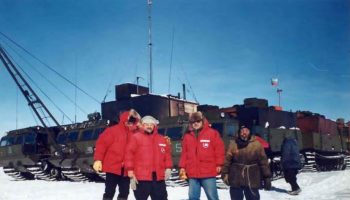There is no unambiguous answer to this question, but there is a lot of speculation. Do we need time to feel and describe reality? Is time travel possible?
“Time is the parameter for describing the reality. People perceive themselves in space and time, therefore, our sense organs perceive the three spatial dimensions: length, width and height. However, according to some suggestions, there is the fourth dimension [of space] and it is time,” – famous Georgian physicist Gia Dvali has said. Currently, he is a professor of theoretical physics at New-York University and Ludwig-Maximilians-Universität in Munich, he is also the Director at Max Planck Institute of Physics and the CERN (the European Organization for Nuclear Research) scientist.
One of the founders of classical physics, Isaac Newton considered that there was no connection between space and time and generally, space is absolute. According to Newton’s law, time is invariable and flows equably without relation to anything external. Newton’s view on time and space is opposed by Albert Einstein’s theory of relativity, saying space has three dimensions, and the fourth dimension is time. This system of ideas has changed the fundamental views of the classical physics on space and time and their ties with the matter.
Physicist Gia Dvali notes that there is acceleration or deceleration of relative time – what does this mean? for example, the well-known “twin paradox”, one of whom makes a journey into space in a high-speed rocket (close to the speed of light, which is approximately 300 000 km /s), when he returns home he finds out that the twin who remained on Earth has aged more. It happened because of the time dilation, it’s an ordinary physical effect, which has been verified experimentally.
Deceleration and acceleration in different parts of the space occur due to gravity. If we come close to the black hole, our biological clock will slow down, because the area of the gravitational field is very strong. Scientists say the nuclear fuel can be exhausted in the solar core and everything can be absorbed due to the gravity. People have long been asking: is it possible to travel through time? As it was mentioned in the example of the twin paradox, it turns out that the theory of relativity makes possibility of time travel to the future. As for the travel to the past, many scientists believe that this is impossible. There will be the cause and effect problem here, for example, they are talking about the “grandfather paradox,” it is a paradox of time travel in which inconsistencies emerge through changing the past. The name comes from the paradox’s common description as a person who travels to the past and kills his/her own grandfather, preventing the existence of his/her father and therefore his/her own existence. British physicist Stephen Hawking has said that the fundamental laws of the nature rule out possibility of such travel. Georgian physicist Gia Dvali says : “I can sit in the spacecraft, travel at light speed, then return back and I’ll appear in the far future because my biological clock runs more slowly and a thousand years pass on the earth. But I cannot come back. As for the travel to the past, I can tell you that it is impossible, because it does not gives us the self-coherence, by traveling to the past, you could change the present, while the nature does not like paradoxes.”
It should be noted that each individual perceive the flow of time differently. It flows slowly or quickly. Time perception depends on various factors, for example: psychological development, health condition, temperament, metabolism, age. Apart from a lot of theories and experiments, it is believed that time only exists in the human mind and does not exist independently. Humans have the demand of measuring time in general. That is why they have developed various time measuring devices, including the water, sun, sand, digital and mechanical clocks. The fact is that it is possible to measure the time and humans need it to establish order.
Author: Nini Mshvenieridze
Translation: Tamar Tabatadze
The Hall of Young Scientists & Analysts – “Doctrina”







